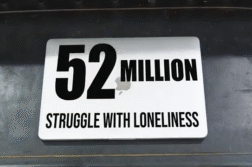COLUMBUS, Ohio (Ivanhoe Newswire) – Major depressive disorder is a mood disorder that lasts two weeks or longer and interferes with daily life. One in three adults with depression aren’t helped by talk therapy or medication. For those patients, specialized treatments with magnets may put them on the path to better mental health. Treatment-Resistant Depression
Eric Clark was just 14 when his parents split up. He noticed he was sad or angry most of the time. Clark was diagnosed with major depression. He tried therapy and his doctors prescribed almost every medication available, more than 15 in all.
“They would max out on the dose of a medication,” Clark shares with Ivanhoe.
Clark thought about suicide and was hospitalized five times. Finally, in 2020, he learned about transcranial magnetic stimulation for depression, or TMS.
The TMS system uses short magnetic pulses of magnetic energy focused directly on the area of the brain thought to be misfiring in patients with depression.
Dr. Kevin Reeves, MD, psychiatrist at the Harding Hospital, explains, “There are different areas of the brain that we may choose to stimulate based on the symptoms that the person’s having.”
The NeuroStar TMS delivers focused energy in short bursts, over three to 18 minutes. Eric received TMS every day for a period of weeks.
“Many patients that receive TMS and do well and are fairly stable for even six months to a year,” Dr. Reeves mentions.
As the depression lifted, Clark began doing things again, starting with a complete kitchen remodel at his mom’s house. Then, he and his wife Samantha started cross country in a motorhome – something depression would never let him do before.
Clark expresses, “I don’t think I’ll ever get back to that state of depression where I feel like I won’t be able to pull myself back out of it. So, that’s what I want people to realize is there is hope.”
Dr. Reeves says if needed, patients can repeat the TMS treatment after a period of time. He says improvements in the technology have increased the speed of treatment. When Eric first started TMS, each treatment took almost 40 minutes. Now, he is treated for three minutes each time. The system is FDA-cleared and is covered by most insurance.
Contributors to this news report include: Cyndy McGrath, Producer; Kirk Manson, Videographer; Roque Correa, Editor.
To receive a free weekly e-mail on medical breakthroughs from Ivanhoe, sign up at: http://www.ivanhoe.com/ftk
Source:
https://www.nimh.nih.gov/health/statistics/major-depression
MEDICAL BREAKTHROUGHS
RESEARCH SUMMARY
TOPIC: TMS FOR TREATMENT-RESISTANT DEPRESSION
REPORT: MB #5083
BACKGROUND: Treatment-resistant depression (TRD) is defined as major depressive disorder (MDD) in adults who have not responded to at least two different antidepressant treatments in the current moderate to severe depressive episode. Treatment resistance occurs commonly in up to 30% of the treated MDD patient population This is not a failure on the part of a patient to recover but an issue with the underlying mechanisms of the products and the body. Essentially, TRD illustrates the lack of total understanding of depression and its causes.
(Source: https://bmcpsychiatry.biomedcentral.com/articles/10.1186/s12888-019-2222-4
https://braincentertms.com/top-5-treatment-resistant-depression-statistics/)
DIAGNOSING: While some scientists believe depression is caused by low levels of happiness-signaling chemicals like serotonin and norepinephrine, others claim it’s simple inflammation. Another recent report suggests that TRD could be caused by low levels of the two genes needed to make brain circuits. If that’s the case, this would explain why antidepressants—which increase serotonin or norepinephrine—may not work as a one-size-fits-all treatment. Some symptoms are lack of response to antidepressants and psychotherapy treatments, increasingly severe and longer episodes of depression, brief improvements followed by a return of depression symptoms, and high anxiety or anxiety disorder
(Source: https://www.psycom.net/depression/depression-treatment/treatment-resistant-depression
NEW TECHNOLOGY: There’s good news for people with severe treatment-resistant depression: Esketamine. It’s a groundbreaking therapy that can provide relief from major depression within hours. Esketamine is made from a drug called ketamine, an anesthetic that has also been used for many years to treat depression. But it wasn’t until recently that esketamine, a more potent version of ketamine, earned FDA approval specifically for use as a nasal spray for those with treatment-resistant depression. Esketamine must be used in conjunction with a conventional antidepressant. The intention is that esketamine provides rapid relief from depression symptoms until the other medication takes effect.
FOR MORE INFORMATION ON THIS REPORT, PLEASE CONTACT:
Lance Bacani
If this story or any other Ivanhoe story has impacted your life or prompted you or someone you know to seek or change treatments, please let us know by contacting Marjorie Bekaert Thomas at mthomas@ivanhoe.com




